Class 10 English Chapter 4.2 Question Answer Maharashtra Board
Balbharti Maharashtra State Board Class 10 English Solutions My English Coursebook Chapter 4.2 Bholi Notes, Textbook Exercise Important Questions and Answers.
Bholi Poem 10th Std Question Answer
My English Coursebook Standard Ten Guide Chapter 4.2 Bholi Textbook Questions and Answers
Warming up:
Chit-chat
1. Discuss the following in your groups.
Question (a)
Discuss the following in your groups.
Various social evils that exist in
(a) big cities
(b) small towns
(c) villages
Answer:
(Use the points given in italic for your discussion,)
(a) Big cities: Female infanticide-dowry-
women’s safety-alcoholism-traffic-addiction- violence
(b) Small towns: Gender inequality at work-low status of women-child labour-caste system.
(c) Villages: Hygiene and sanitation-Religious conflicts – superstitions – poverty -illiteracy – consuming alcohol.
![]()
Question 2.
Very few youngsters like to take social work as a career. Discuss the reasons why they do not take it seriously.
Answer:
Very few youngsters like to take up social work as a career because
- No sense of accomplishment.
- No fixed income.
- No fixed duty hours and time.
- 24 × 7 work.
- Uncertainty of future.
1. Adjectives and some Adverbs can be used in three degrees of comparison.
Question 1.
Adjectives and some Adverbs can be used in three degrees of comparison.
Positive-For example, cold, tall, heavy, fast, beautiful, little.
Comparative-For example, colder, taller, heavier, faster, more beautiful, less.
Superlative-For example, coldest, tallest, heaviest, fastest, most beautiful, least.
Fill in the Table.
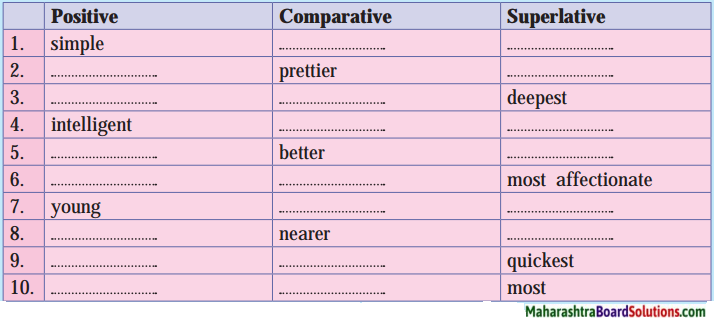
Answer:
| Positive | Comparative | Superlative |
| 1. simple | simpler | simplest |
| 2. pretty | prettier | prettiest |
| 3. deep | deeper | deepest |
| 4. intelligent | More intelligent | Most intelligent |
| 5. good | better | best |
| 6. affectionate | More affectionate | Most affectionate |
| 7. young | younger | youngest |
| 8. near | nearer | nearest |
| 9. quick | quicker | quickest |
| 10. much/many | more | most |
2. Pick out Hindi words used in the story written in English. Give their English alternative:
Question 2.
Pick out Hindi words used in the story written in English. Give their English alternative:
(a) Bholi – simpleton
(b) ………………………
(c) ………………………
(d) ………………………
(e) ………………………
Answer:
(a) Bholi – simpleton
(b) Numberdar – revenue official
(c) Tehsildar – collector
(d) Cinema – movie
(e) Pitaji – father
![]()
3. Write three advantages and three drawbacks for each of the following:
Question 1.
Write three advantages and three drawbacks for each of the following:

Answer:
| Advantages | Drawbacks | |
| City Life | 1. Rich amenities 2. Ample job opportunities 3. Good transportation | 1. Fast life 2. Extremely congested 3. Air, water, noise, harmful pollution |
| Village Life | 1. Peaceful environment 2. Follow tradition and culture 3. Enjoy beauty of nature | 1. Miss the Conveniences and opportunities of life. 2. Ignorance, prejudice and narrowness 3. Blind faiths, Superstitions |
English Workshop:
Question 1.
Complete the following sentences using words given in the brackets:
(contemplating, humiliate, scurried, disfigured, envious, contemptible, matted, startled)
(a) After the accident, Juhi’s face was ……………….. .
(b) It took a long time to straighten the ……………….. bundle of wool.
(c) After class, students ………………… out for their lunch – break.
(d) One should never ……………………. the disabled people.
(e) Nutan was ……………….. of her sister, who won the ‘Best Singer’ award.
(f) Corruption is a ……………………… act.
(g) We are ………………… seriously about buying a new apartment.
(h) I was …………………… to see a snake in my room.
Answer:
(a) After the accident Juhi’s face was disfigured.
(b) It took a long time to straighten the matted bundle of wool.
(c) After class, the students scurried out for their lunch-break.
(d) One should never humiliate the disabled people.
(e) Nutan was envious of her sister, who won the ‘Best Singer’ award.
(f) Corruption is a contemptible act.
(g) We are contemplating seriously about buying a new apartment, (completing/contemplating)
(h) I was startled to see a snake in my room.
![]()
2. The story focusses on some social problems and evil practices that are prevailing in the society. Read the text carefully and make a list of all social problems and evil practices. Discuss in the class to find some solutions to these problems. One is done for you.
Question 1.
The story focusses on some social problems and evil practices that are prevailing in the society. Read the text carefully and make a list of all social problems and evil practices. Discuss in the class to find some solutions to these problems. One is done for you.

Answer:
| Social problems and evil practices | Probable Solutions |
| 1. Discrimination between a boy child and girl child. | 1. Both must be treated equal at family, school and society levels. |
| 2. Girl education | 2. Education should be given to girls to understand their rights. |
| 3. Dowry | 3. We should not give or take dowry and should complain about such practices. |
| 4. Marriage with an old person for property. | 4. Girls should oppose such marriages. |
3. Fill in the boxes with proper letters so as to find various characters in the story by their specialities. One is done for you.
Question 1.
Fill in the boxes with proper letters so as to find various characters in the story by their specialities. One is done for you.
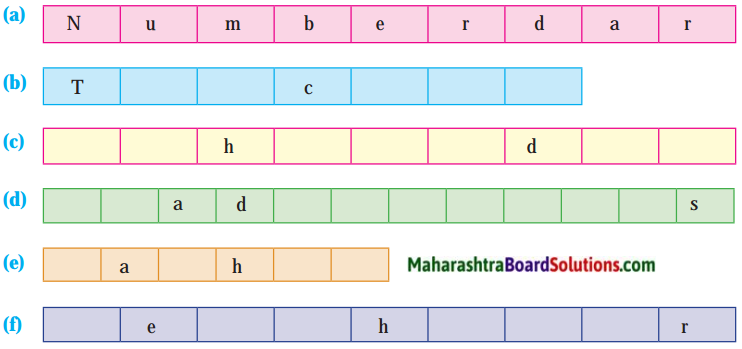
Answer:
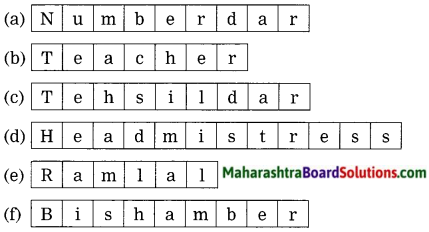
4. Glance through the story again and describe Bholi’s character before and after her meeting with the teacher. Complete the table and then write two paragraphs describing the changes seen in her character.
Question 1.
Glance through the story again and describe Bholi’s character before and after her meeting with the teacher. Complete the table and then write two paragraphs describing the changes seen in her character.
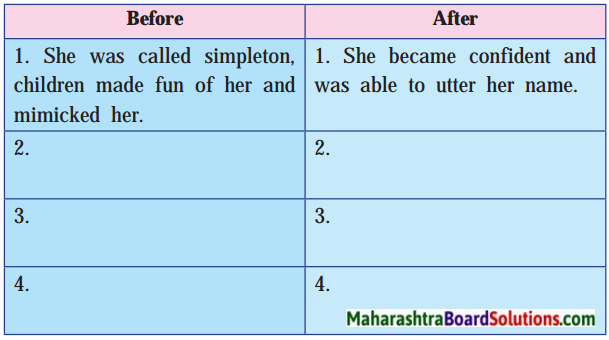
Answer:
| Before | After |
| 1. She was called simpleton, children made fun of her and mimicked her. | 1. She became confident and was able to utter her name. |
| 2. She had neither good looks nor intelligence. | 2. She changed herself mentally and became smart. |
| 3. She was frightened and had no courage to speak. She was like a dumb cow. | 3. She became bold and got courage to say what is right and what is wrong. |
| 4. She couldn’t take her own decisions. | 4. She could take her own decisions of her life only because of the confidence her teacher had given. |
Bholi-A Courageous girl
Bholi was a backward child from her childhood and was known as simpleton. She had an attack of smallpox at the age of two and her entire body was pockmarked except for her eyes. She had neither good looks nor intelligence. Being fourth daughter of her parents, she couldn’t get any comforts of her life so she was always under pressure and had no courage to speak.
She was always frightened so she was known as a dumb cow. She couldn’t even talk properly because of her stammering habit. So she couldn’t speak out her thoughts and couldn’t take decision of her life. Overall she was sad, frightened and used to live life under the pressure of her parents.
But when she started going to school, her life was totally changed. She met a teacher who was kind and supportive. With her help she became confident and was able to utter her name properly. She changed herself mentally and became smart.
She also got courage to say what is right and what is wrong, so she refused to get married to a person who was her father’s age and decided to serve her parents. At last she was able to take her own decisions of her life with the confidence her teacher had given to her. She decided to follow the path shown by her teacher and teach in the same school where she learnt.
![]()
5. Find out synonyms from the passage for the following words:
Question 1.
Find out synonyms from the passage for the following words:
Answer:
- humiliate – put to shame
- surely – certainly
- fortunate – lucky
- contentment – satisfaction
6. Expand the proverb in about 12 to 15 lines, ‘Where there is a will, there is a way.’
Question 1.
Expand the proverb in about 12 to 15 lines, ‘Where there is a will, there is a way.’
Steps:
1. Explanation of the proverb in simple words.
2. Examples/Experiences to prove the proverb.
3. Conclusion.
Answer:
‘Where there is a will, there is a way’
Success and achievement in life are not possible without strong will. All great personalities and personages who have left permanent prints of their lives on the society, are the men and women who had indomitable (invincible) will. If we are determined to do something, we will get it done only when we have a strong will. Most of the successful people overcome a number of difficulties to find the right path to success, that is the reason why they are successful. The examples of Helen Keller, Dr. Babasaheb Ambedkar, Dr. A.P.J. Kalam, Dhirubhai Ambani and many others aptly prove the proverb.
Will power, determination and dedication help us to make impossible things possible. Only if we have the will to win, we would surely find our way sooner or later. Whatever inventions are seen today were a problem one day. But the will and hardwork of the inventors found their solutions. Impossible is possible for the person of strong will. Every successful man fails many a times but with unshaken faith and strong will, he becomes successful one day. Think high, try your best, without being daunted by the odds of the path and success is yours.
One step at a time and that well placed will take you to the grandest height. The only thing is to start with firm determination, strong will and the way is yours. So it is rightly said, “Where there is a will, there is a way.”
![]()
7. Read the extract beginning from:
Question 1.
Read the extract beginning from-
“Her name was Sulekha …. find bridegroom for them.” Narrate this extract in short, making Sulekha (Bholi) the narrator. Write it in your notebook. Begin with “I was named Sulekha….”
Answer:
I was named Sulekha but since my childhood everyone had been calling me Bholi, the simpleton.
I was the fourth daughter of Numberdar Ramlal. When I was ten months old, I had fallen off the cot on my head and perhaps it had damaged some part of my brain. That was why I remained a backward child and came to be known as Bholi, the simpleton.
At birth I was very fair and pretty. But when I was two years old I had an attack of smallpox. Only the eyes were saved. But the entire body was permanently disfigured by deep black pockmarks. I could not speak till I was five and when at last I learnt to speak, I stammered. The other children often made fun of me and mimicked me. As a result, I talked very little.
My father Ramlal had seven children, three sons and four daughters, and the youngest of them was me. Ours was a prosperous farmer’s household and there was plenty to eat and drink. All the children except me were healthy and strong. My brothers had been sent to the city to study in schools and later in colleges. Of the sisters, Radha, the eldest had already been married. The second sister Mangala’s marriage had also been settled. My father would think of my third sister Champa. They were good looking, healthy girls. And it was not difficult to find bridegrooms for them.
8. Interview:
Question 1.
Interview-
Prepare a set of 10-12 questions that you would ask at an interview of a person who has strongly acted against social injustice and has achieved success in spite of a long struggle against so many odds in his/her life.
Answer:
Good morning, Sir.
You are welcome in …………
Can you spare some time for us?
- How did you get attracted towards social injustice?
- Was it your passion from the beginning to work for the society?
- How do you come to know about such unfair practices?
- What do you do when you come to know such problems of injustice?
- The world might be making progress in terms of providing social justice-
How do you feel when you hear such kind of social injustice? - What difficulties did you face while doing your work?
- Can you give any striking examples of injustice in which you have achieved success?
- Social injustice is a disease-what do you think about it?
- How did you make the person confident who was harrassed?
- What are your future plans related to your work?
- What message would you give to the youngsters about such incidents of injustice?
Language Study:
Question 1.
Rewrite the following in indirect speech:
“Put the fear out of your heart and you will be able to speak like everyone else.”
Answer:
The teacher told/advised Bholi to put the fear out of her heart and she would be able to speak like everyone else.
![]()
Question 2.
“Yes, certainly,” his wife said, “Bholi will be lucky to get such a well-to-do bridegroom.”
Answer:
His wife said with certainty that Bholi would be lucky to get such a well-to-do bridegroom.
Question 3.
“What will that witless one say? She is like a dumb cow”. “May be you are right,” muttered Ramlal.
Answer:
Ramlal’s wife asked Ramlal what that witless one would say. She was like a dumb cow. Ramlal muttered that it was possible that she was right.
Question 4.
“Be a little considerate, please. If you go back, I can never show my face in the village.” “Then out with five thousand.”
Answer:
Ramlal requested the bridegroom to be a little considerate. He further said that if he went back, he could never show his face in the village. The bridegroom then told Ramlal to give out five thousand to him.
Question 5.
“Pitaji, take back your money. I am not going to marry this man.” “Bholi, are you crazy?” shouted Ramlal.
Answer:
Bholi told her father to take back his money as she was not going to marry that man. Ramlal angrily asked Bholi if she was crazy.
2. Rewrite the sentences given below as per the given Degree of Comparison without change of meaning:
Question 1.
Rewrite the sentences given below as per the given Degree of Comparison without change of meaning:
(a) You are not as young as she is. (Comparative)
(b) His fourth daughter’s wedding was the grandest of all. (Positive)
(c) Bholi was younger than all his other daughters. (Superlative)
Answer:
(a) She is younger than you.
(b) No other daughter’s wedding was as grand as his fourth daughter’s wedding.
(c) Bholi was the youngest of all his daughters.
![]()
3. Correct the errors in the following sentences. Focus on verbs and subject.
(a) All children, except Bholi, was healthy and strong.
(b) Since childhood, everyone will have calling her Bholi.
(c) If girls goes to school, who will marry them?
(d) New clothes was never made for Bholi.
(e) The garland were flung into the fire.
(f) Do you wants to hear more?
(g) Aren’t that right?
(h) I will teaches in the same school.
My English Coursebook 10th Digest Chapter 4.2 Bholi Additional Important Questions and Answers
Simple Factual Activities:
Question 1.
Fill in the blanks:
(Answers are directly given and underlined.)
Answer:
1. Ramlal had three sons and four daughters.
2. All the children except Bholi were healthy and strong.
Question 2.
State whether you Agree or Disagree with the following statements:
Answer:
- Ramlal was a Government servant. – Agree
- Ramlal had not the courage to disobey his wife. – Disagree
- Bholi’s eldest sister Radha was married. – Agree
- Bholi had neither good looks nor intelligence. – Agree
Choose the correct alternative for each of the following questions:
Question 1.
What does the word ‘Bholi’ mean?
Answer:
- angry
- foolish
- simpleton
- sad.
![]()
Question 2.
At what age Bholi had an attack of smallpox?
Answer:
- six
- two
- ten
- nine.
Question 3.
What was the real name of Bholi?
Answer:
- Radha
- Champa
- Mangala
- Sulekha.
Question 4.
Who was not healthy and strong in Randal’s Family?
- Radha
- Bholi
- Mangala
- Champa.
Answer:
- simpleton
- two
- Sulekha
- Bholi.
Who said to whom:
Question 1.
“Come with me. I will take you to school.”
Answer:
Ramlal said to Bholi.
![]()
Question 2.
“What is your name, little one?”
Answer:
The teacher said to Bholi.
Question 3.
Put [✓] or [✗] in front of the following sentences:
Answer:
- Bholi was the beloved daughter of Ramlal. – [✗]
- Bholi used to wear old dresses of her sisters. – [✓]
- Bholi was happy to see so many girls of her age in the school. – [✓]
- All the girls in the school were laughing at Bholi. – [✓]
Question 4.
State whether the following statements are True or False:
Answer:
- Bishamber was a young bridegroom. – False
- Ramlal had never dreamt that his fourth daughter Bholi would have such a grand wedding. – True
- When Bholi was brought near the sacred fire she was in a red silken bridal dress. – True
- Bholi felt herself lucky to get a well-to-do bridegroom like Bishamber. – False
Question 5.
Complete the following sentences:
(Answers are directly given and underlined.)
Answer:
1. Bholi’s parents were eager to accept Bishamber’s proposal for marriage because they felt that she might remain unmarried all her life.
2. Bholi’s elder sisters who had come for her marriage were envious of her luck.
Question 6.
Choose the correct alternative and complete the following sentences:
(Answers are directly given and underlined.)
Answer:
1. The garland of marriage was made of yellow marigolds.
(a) roses
(b) yellow marigolds
(c) lilies
2. Bishamber demanded five thousand rupees to get married to Bholi.
(a) two thousand rupees
(b) three thousand rupees
(c) five thousand rupees.
3. Bholi is compared with a dumb cow.
(a) a dumb cow
(b) a kind cow
(c) a dead cow
4. Bholi was not ready to get married.
(a) Bishamber
(b) Bholi
(c) Bholi’s friend
![]()
Complex Factual Activities:
Question 1.
Complete the following web:
(Answers are directly given.)
Answer:
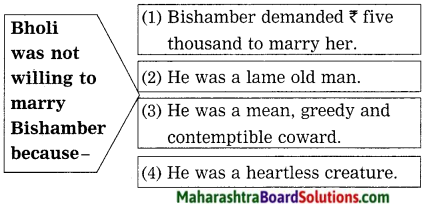
Question 2.
Why did the bridegroom refuse to garland Bholi? (HcMIHdl} ‘Mlcdldl W. HI=bK<r1?)
Answer:
When a woman slipped back the silken veil from Bholi’s face, the bridegroom saw her pockmarked face. So he demanded five thousand rupees from her father and refused to marry her, unless he paid the amount.
Question 3.
What was the expression on Bholi’s face?
Answer:
Bholi was looking up. Her eyes were not downcast. She was looking up looking straight at her prospective husband. There was neither anger nor hate in her eyes. They showed only cold contempt.
Question 4.
What shocked the family members?
Answer:
When Bishamber demanded money from Bholi’s father, Bholi got angry and her hand struck out like a streak of lightning and the garland was flung into the fire. She got up and threw away the veil. She told her father in a clear loud voice without the slightest stammer to take back his money as she was not going to marry that man. Thus Bholi’s firm and staight statement shocked the entire family.
![]()
Question 5.
Who said to whom:
1. “Yes, Aunty, you are right. You all thought I was a dumb-driven cow.”
2. “I will serve you and mother and I will teach in the same school where I learnt so much.”
Answer:
1. Bholi said to the old woman.
2. Bholi said to her father.
Complex Factual Activities:
Question 1.
Describe the appearance of Bholi.
Answer:
Bholi was the youngest daughter of Ramlal. Some part of her brain was damaged, so she was a backward child. Her entire body was permanently disfigured by deep black pockmarks when she had an attack of smallpox. She was very weak. She had neither good looks nor intelligence.
Question 2.
Complete the reasons:
Ramlal decided to send Bholi to school because – ……………………………………..
Answer:
Ramlal decided to send Bholi to school because – ……………………………………..
- the Tehsildar urged him to send his (Randal’s) daughter to school.
- he had no courage to disobey the Tehsildar.
- his wife was also ready to do so.
Complete the following:
Question 1.
Bholi talked very little because – …………………….
Answer:
Bholi talked very little because she stammered and other children often made fun of her and mimicked her.
![]()
Question 2.
Why did Ramlal’s wife oppose sending Bholi to School?
Answer:
Ramlal’s wife opposed sending Bholi to school because she thought that if she went to school, nobody would marry her.
Question 3.
What shows that Bholi was unwilling to go to school?
Answer:
Bholi did not know what a school was like when her father was taking her to school. She remembered how a few days ago their old cow Lakshmi had been turned out of the house and sold so she was frightened to go to school.
Question 4.
How did Bholi’s parents change her appearance?
Answer:
Bholi was given some decent clothes to wear instead of old dresses of her sisters. No one cared to mend or wash her clothes. But she was bathed and oil was rubbed onto her dry and matted hair. And they made her ready to go to school.
Question 5.
What made the class attractive to Bholi?
Answer:
When she saw many girls almost of her age present there, she became glad. She also hoped that one of those girls might become her friend. She saw the pictures on the wall and the colours fascinated her. Her lady teacher was also kind to her. All those things attracted Bholi.
Question 6.
Why did Bholi feel ashamed?
Answer:
The lady teacher who was teaching in the class asked Bholi what her name was. But she could not utter her name ‘Bholi’ properly. As she was stammering, she felt ashamed in front of other girls. She began to cry. She felt ashamed because all the girls in the class were laughing at her.
![]()
Question 7.
How would you describe the teacher’s attitude towards Bholi? Give 3 to 4 points.
Answer:
The teacher was very kind and sympathetic towards Bholi. She spoke with her in soft and soothing voice. Instead of commanding, she was just giving her friendly suggestions so Bholi felt better in her company. She had never been called with that much love; so it touched her heart.
Question 8.
How did the teacher encourage Bholi to overcome her stammering?
Answer:
When the teacher asked Bholi what her name was, she could not utter a single word because of fear. With the teacher’s encouraging words and pat on her back she felt relieved to give a trial. And thus Bholi could give up her stammering and overcome her fear.
Question 9.
Complete the following web.
Answer:
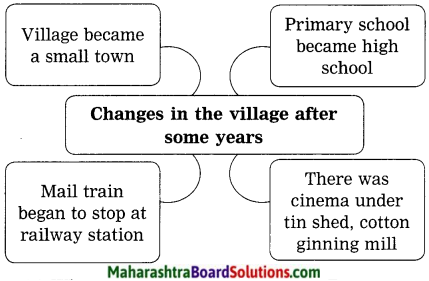
Question 10.
What were the drawbacks of Bishamber as a bridegroom?
Answer:
1. Bishamber was as old as Bholi’s father.
2. He was married.
3. The children from his first wife were quite grown-up.
Question 11.
Complete the following:
(Answers are directly given and underlined.)
Answer:
1. Beside the humiliation and grief, Ramlal was afraid of Bholi’s marriage as he thought that no one would ever marry Bholi.
2. Bholi told her father in a calm and steady voice that she would serve him and mother in their old age and she would teach in the same school where she learnt so much.
![]()
Question 12.
Name the artist and the masterpiece.
Answer:
The teacher who gave courage to Bholi was the real artist and Bholi was the masterpiece of her creation.
Question 13.
Arrange the following sentences as per their order of occurrence in the passage:
- Bholi’s teacher was satisfied with her student’s decision.
- Bholi learnt a lot of things in her school.
- Bholi refused to get married to Bishamber because she knew that he would not keep her happy.
- Bholi decided to serve her parents and teach in the same school where she learnt.
Answer:
- Bholi learnt a lot of things in her school.
- Bholi refused to get married with Bishamber because she knew that he would not keep her happy.
- Bholi decided to serve her parents and teach in the same school where she learnt.
- Bholi’s teacher was satisfied with her student’s decision.
Activities based on Vocabulary:
Question 1.
Find out from the passage opposites for the following words:
(Answers are directly given and underlined.)
Answer:
- forgot × remembered
- indecent × decent
- sad × glad
- bore × fascinated
Question 2.
Use the following phrases in the following sentences by making certain changes :
(Answers are directly given and underlined.)
Answer:
(to shout in terror, to pass on, to hand over, to look . up at.)
- My sister handed over a letter of apology to her class teacher.
- My father had the day off because he didn’t want to pass on his flu to everyone in the office.
- Ruta shouted in terror when she saw a cobra in front of her.
- The world looks up at Dr Kalam as a great visionary.
![]()
Question 3.
Find the verb forms of the following from the passage ;
- mimicry
- settlement
- speech
- marriage.
Answer:
- mimick
- settle
- speak
- marry.
Question 4.
Read the given sentences and write the words of each sentence in the proper columns:
Answer:
- The old dresses of her sisters were passed on to her.
- Today she was lucky to receive a clean dress.
- And suddenly Bholi noticed that the teacher was standing by her side.
- Then she began to cry and tears flowed from her eyes.
| Nouns | Verbs | Adjectives | Adverbs |
| 1. -dresses -sisters | Were passed | old | – |
| 2. dress | was | -lucky -clean | today |
| 3. teacher | -noticed -was standing | – | -suddenly -by side |
| 4. -tears -eyes | -began – flowed | – | Then |
Question 5.
Complete the following sentences using words given in the brackets:
(disfigured, matted, fascinated) (Answers are directly given and underlined.)
Answer:
The beautiful scenery fascinated me.
![]()
Question 6.
Complete the following sentences using the words given in the brackets:
(scurried, affectionately, astonished, a great achievement) (Answers are directly given and underlined.)
Answer:
- My father always tries to solve my problem affectionately.
- My mother was astonished to see her brother in front of her after so many years.
- Overcoming her difficulties was a great achievement for Bholi.
Question 7.
Complete the following sentences using the words given in the brackets:
(envious, procession, overjoyed, pockmarks) (Answers are directly given and underlined.)
Answer:
- Most of the youngsters like to dance in marriage procession.
- He was overjoyed to see his friend after a long time.
- Due to pockmarks on her face, she is rejected by many for a marriage.
Question 8.
Find out synonyms from the passage for the following words: (Answers are directly given.)
Answer:
1. senseless – witless
2. jealous – envious.
Question 9.
Find ‘one word’ for the following from the passage:
Answer:
- garment that covers the head and face – veil
- hurt the pride of – humiliate
- joyful and proud especially because of success – triumphant
- related to the future – prospective
Question 10.
Complete the following sentences using the words given in the brackets:
(contemptible, humiliate, startled, thunderstruck) (Answers are directly given and underlined.)
Answer:
Sujata was thunderstruck when he presented her with an engagement ring.
Question 11.
Find out synonyms from the passage for the following words:
(Answers are directly given and underlined.)
Answer:
- contempt – hatred
- prospective – future
- startled – shocked.
![]()
Question 12.
Complete the following sentences by choosing the words given in the brackets:
(Answers are directly given and underlined.)
Answer:
She violently disagreed with what we said. (slowly/violently)
Question 13.
Find out synonyms from the passage for the following words :
(Answers are directly given and underlined.)
Answer:
formal event – ceremony
Activities based on Contextual Grammar:
Question 1.
Name the Tenses:
1. I will tell you what to do.
2. Ramlal consulted his wife.
Answer:
1. Simple Future Tense
2. Simple Past Tense.
Question 2.
Change into indirect speech:
Randal’s wife said to him, “I will tell you what to do.”
Answer:
Randal’s wife told him that she would tell him what to do.
Question 3.
Rewrite as an exclamatory sentence:
The child was very fair and pretty.
Answer:
How fair and pretty the child was!
Do as directed:
Question 1.
The child was very fair and pretty.
(Choose correct alternative to make it exclamatory.)
1. What a fair and pretty the child was!
2. How a fair and pretty the child was!
3. How fair and pretty the child was!
Answer:
2. How fair and pretty the child was!
![]()
Question 2.
It was not difficult to find bridegroom for them. (Underline the infinitive in the sentence.)
Answer:
It was not difficult to find bridegroom for them.
Change the voice:
Question 1.
The teacher patted her affectionately.
(Begin the sentence with “She….)
Answer:
She was patted affectionately by the teacher.
Question 2.
The teacher encouraged her.
(Begin the sentence with “She….)
Answer:
She was encouraged by the teacher.
Question 3.
She was a harmless dumb cow.
(Make it exclamatory.)
Answer:
What a harmless dumb cow she was!
Question 4.
What a shameless girl! (Make it assertive.)
Answer:
She was really a shameless girl.
Frame a wh-question to get the underlined part as an answer:
Question 1.
Ramlal placed the bundle at the bridegroom’s feet.
Answer:
Where did Ramlal place the bundle?
![]()
Question 2.
Bishamber raised the garland to place it round the bride’s neck.
Answer:
Why did Bishamber raise the garland?
Rewrite the following as per the tenses mentioned in the brackets:
Question 1.
Ramlal stood rooted to the ground.
(Past Continuous Tense)
Answer:
Ramlal was standing rooted to the ground.
Question 2.
The teacher was watching the drama.
(Present Perfect Continuous Tense.)
Answer:
The teacher has been watching the drama.
Question 3.
Complete the words by using correct letters:
Answer:
- br_in – brain
- stu_y -study
- dr_ss – dress
- hea_t -heart
![]()
Question 4.
Put the words in alphabetical order:
1. violently, grief, proposal, astonish.
2. marriage, matter, manage, make.
Answer:
1. astonish, grief, proposal, violently.
2. make, manage, marriage, matter.
Question 5.
Punctuate the following sentences:
1. whats the matter with you you fool shouted ramlal
2. have you seen her said bishamber to the friend next to him she has pockmarks on her face.
Answer:
1. “What’s the matter with you, you fool?” shouted Ramlal.
2. “Have you seen her?” said Bishamber to the friend next to him. “She has pockmarks on her face.”
Question 6.
Make four words (minimum 3 letters each) using the letters in the word ‘contemplating’.
Answer:
- complain
- contempt
- tempt
- contain.
Question 7.
Write related words as shown in the example: (Answer is directly given and underlined.)
Answer:
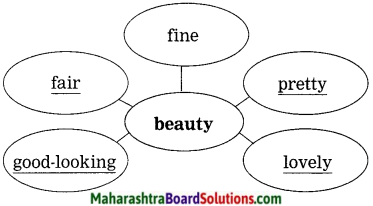
Question 8.
Complete the word-chain of verbs. Add four words, each beginning with the letter of the previous word.
disfigure, e…………., …………….., …………….., ……………..
Answer:
disfigure, → enter, record , detect, tend.
![]()
1. Attempt anyone:
Question (a)
Make a meaningful sentence by using the given phrase: “to make fun of’
Answer:
It is not good to make fun of any disabled person.
OR
Question (b)
Add another clause to the following sentence expand meaningfully:
My teacher was angry – ………………………………….
Answer:
My teacher was angry because some students misbehaved in the class.
2. Attempt anyone:
Question (a)
Add prefix or suffix to make new words.
1. decorate
2. courage
Answer:
1. decorative, decoration
2. courageous, discourage.
OR
Question (b)
Make a meaningful sentence using any one of the following words.
1. decorate
2. courage
Answer:
1. We shall decorate our classroom with flowers and balloons on Independence Day.
2. He showed great courage in the dangerous situation.
Personal Response:
Question 1.
What do you think about your school?
Answer:
My school is the second home for me. I meet my friends and share my sorrows and joys with them. I can take proper guidance and advice from my teachers. It is the place which I love from the ; bottom of my heart.
![]()
Question 2.
How do you feel on the first day of your school?
Answer:
When I go to school after a long vacation I feel very happy and excited to meet my friends. There is always a curiosity about a new class teacher and newcomers in the class. New dress, new bag I and books add more excitement on the very first day of my school, so I like it very much.
Explain the following statements:
Question (a)
She had neither good looks nor intelligence.
Answer:
According to her parents, she was neither beautiful nor literate. She was ugly. Being uneducated and ugly nobody will accept her as a life partner. It also means good looks and intelligence are important in our life but it is not at all right.
Question (b)
Let the teachers at school worry about her.
Answer:
Bholi’s parents were careless about her. They ignored her education. When the Tehsildar sahib told her father to send his daughter to school, he reluctantly was ready. The mother knew that there was little chance of getting her married because of her ugly face and lack of sense. There will be no need to worry about her, if she gets some education. So her mother said, “Let the teachers at school worry about her.”
Question 4.
Is it good to make a fun of the child who can’t speak well? (dld-m WJfNqj) Hyihl -‘Wl 3TT% ^T?)
Answer:
No, it’s not good to make a fun of the child who can’t speak well because it is his disability and it is not good to laugh at somebody’s disability. We should encourage him/her to speak so that he/she would speak clearly. It will boost his/her confidence whereas teasing him/her will down his/her moral.
Question 5.
“If girls go to school, who will marry them?”-Why, do you think, that Bholi’s mother thought so?
Answer:
It is sad that some communities still discriminate against the education of the girl child. The condition in the past was worse. If a girl child was sent to school nobody would be ready to get married to her. Education was not at all important for any girl in those days. It was her duty to look after ‘Home and Hearth’ so taking education was considered to be useless then. Bholi’s mother was also from the same era. So she thought that nobody would marry their daughters, if they were sent to school.
![]()
Question 6.
Why does positive encouragement work better than criticism?
Answer:
Positive encouragement helps us to focus on our self-centred outlook. Positivity also reduces | our anxiety whereas criticism leads us towards fear, anger and stress. A word of encouragement can go a long way in our daily lives as it is the most effective motivator. It recognizes and fosters continual growth and effort. It builds determination and confidence so it is always better than criticism.
Question 7.
Her heart was throbbing with the thought of new hope and new life-Explain.
Answer:
After going to school, Bholi realised that she was happy there. She had a new hope for her life as the life of school was better than her family life. She was quite happy in school because the teacher and her classmates were really co-operative and she was happy with them. So she had a new hope in her new school life.
Question 8.
What is your opinion about Bholi’s bridegroom? Should she get married to him?
Answer:
I think Bholi’s bridegroom was aged with grown-up children from his first wife. She should not get married to a person who is almost the age of her father. There was a vast difference in their age so it did not seem to be a good couple/match.
Question 9.
What did you learn from Bholi’s action of not getting married to Bishamber?
Answer:
Bholi has done the right thing. She wouldn’t be happy with the person who was of her father’s age. He was greedy and heartless. Her married life would have been ruined. So the decision taken by her not to get married to Bishamber was right.
![]()
Question 10.
“The teacher is an artist.” Do you agree with the statement. Justify your answer.
Answer:
Yes, I fully agree with the statement. The teacher is an artist who fills colours in lives of many students. Whenever he/she sees his/her student successful in his/her life, he/she feels satisfied from the bottom of his/her heart. His/her joy is greater | than anything else in the world. Seeing his/her student at the top, makes him/her feel proud and contented. It is like an artist contemplating after completing his/her masterpiece. He is the sculptor of i the students’ future and shapes and colours their lives.
My English Coursebook 10th Class Solutions